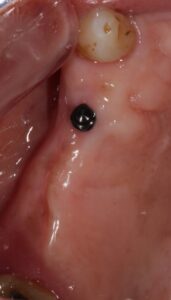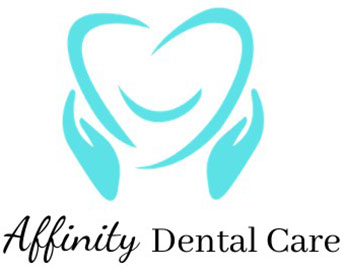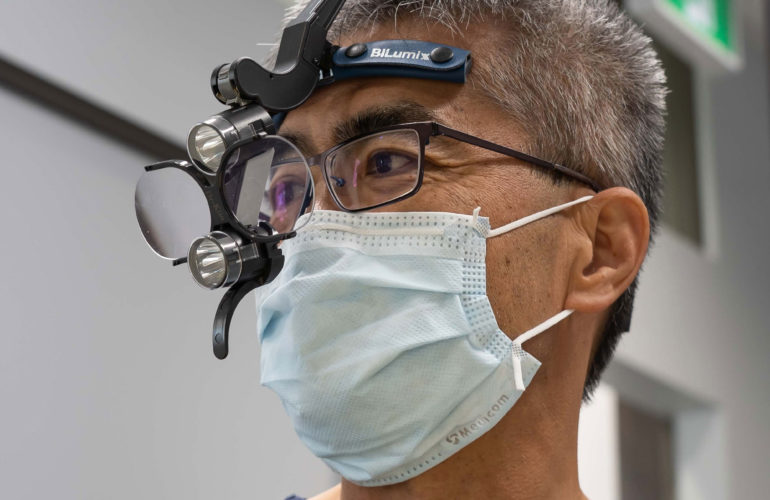Affinity Dental Care – Mini Implants
Where there is periodontitis (infection in the supporting gums and bone around the teeth), the bone disappears and gets smaller. When the teeth are extracted, the jaw bone shrinks and diminishes in dimensions. Both gum disease and extraction can change the shape and size of the jaws. A person with all teeth extracted would eventually display a suck-in look at the lips. This is where mini dental implants come in.

Dental implants can help to maintain and stimulate bone growth when embedded in the jaw bone. The primary material used for implants is titanium, a strong but lightweight metal compatible with the human body and therefore would not prompt a reaction from the immune system.
Dental implants need to be wholly embedded within the jaw bone for proper healing and osteointegration, but when the dimensions of the jaw bone become too small and thin after years of shrinkage, the traditional implants can be too big in diameter, too long for the available jaw bone.
What Are Traditional Implants?
Traditional implants have diameters bigger than 3.25 mm and up 5 mm. There are extra-wide implants that are up to 9 mm in diameter. The traditional and extra-wide ones are made of at least two pieces – the implants (the fixtures in the bone) and the pieces attached to the implants (called the caps or abutments). When the jaw bone is not wide enough, a bone graft and guided bone regeneration (GBR) can be performed to gain more bone. However, not all patients and situations are suitable for these procedures before placing an implant. Mini dental implants (MDIs)can be an option for some instances with insufficient bone.
What Are Mini Implants?
They have the same structure as the traditional implants but are smaller than 3 mm in diameter and include a ball-shaped end that protrudes from the jawbone as one structure. Because of their smaller size, mini implants are also called narrow diameter implants or small diameter implants (NDIs and SDIs).
MDIs are smaller and, therefore, can fit in the narrower jaw. The procedure to place the mini implants is much less involved. Since the amount of bone and dimensions are dramatically different at different locations along the jaw, in most cases, I would order a 3-dimensional cone beam tomography X-ray of the jaw first to locate the suitable and safe areas (away from some vital tissues and structures) before the implant placements.
After careful planning and fabrication of a surgical guide for the implant placements, the implant surgical procedure is done without cutting gums as is the traditional way to expose the underlying bone. No suture is needed, and minimal bleeding ensures afterward. Post-surgical pain is usually very minimal.

Why Mini-Implants?
Because of the simplicity and quickness of the procedure, the use of mini dental implants can be considered in cases the patients:
- Have compromised health to undergo invasive surgery
- Do not have enough bone in the jaw for a full-sized implant
- Do not have enough time to go to repeat dental visits
- Wants minimal pain and faster recovery time
- Do not have enough money for the conventional implants and hybrid dentures or bridges
Who is a Good Candidate for Mini Dental Implants?
Mini-implant is indicated for patients with missing teeth (partial edentulous with some natural teeth), who will have partial dentures (removable plates) or wearing existing dentures. The MDIs with ball attachments can help stabilize and retain the dentures, making the wearer feel comfortable and secure.
Patients with certain health conditions like diabetes, vascular disease, or blood thinner can benefit from mini-implants. Some lifestyle factors like being a smoker but decent oral hygiene can succeed better with mini-implant.
However, mini dental implants are not for everyone. If there is excessive bone loss (the width of the bone is less than 4.5 mm and the length is less than 10 mm), even mini-implants would not have enough bone for them. If the density of the bone is too low, like in patients with osteopenia to osteoporosis, mini-implants would not have good stability. They are unsuitable for patients who grind and clench their teeth excessively. They are not indicative of supporting crowns or bridges. Straumann makes the mini-Implant I use in patients at Affinity Dental Care. Besides being less invasive, the reasons I only use Straumann mini-implants are because:
They are made with Roxolid, which has higher mechanical strength than titanium. Roxolid is a proprietary alloy with ~85% titanium and ~15% zirconium. The combination of the properties of these two metals leads to higher tensile and fatigue strength than comparable titanium implants. The higher a material’s tensile strength, the lower the risk for forced rupture. Higher fatigue strength is more critical in small implants, meaning the implants have a lower chance of fracture. Sandblasted, large grit, acid-etched implant surface, (SLA) is a type of surface treatment that creates surface roughness intending to enhance osseointegration through more significant bone-to-implant contact (BIC). This specially treated surface enhances osteointegration rate and high consistent survival rates.

Other Benefits Include:
- They can be made to fit your existing dentures
- Easy cleaning
- Firmer denture fit
- High success rate
- Good long-term results
Care and Maintenance
Mini dental implants just need the same care as natural teeth. If you have mini dental implants, brush your teeth twice daily, floss once a day, and visit your dentist regularly.
Past Results

The photo shows a Straumann Roxolid mini-implant right after it was placed by Dr. Wong recently.

The second photo shows the healing of the same implant after a week.
To make an informed decision, talk to a dentist experienced in both mini and standard implants.
– 686 Walkers Line, Burlington ON L7N 2E9
– Phone: (289)-861-5111
– Email: info@affinitydentalcare.ca
Follow us on Facebook


